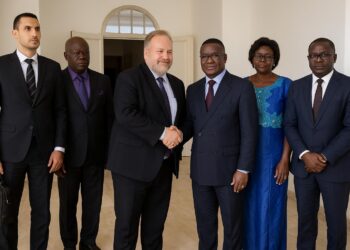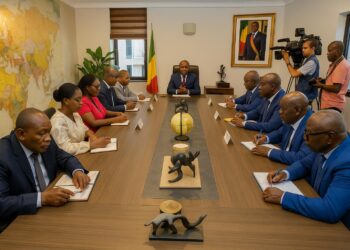Logistical choreography behind the 125 254 candidates
In Brazzaville’s Ministry of Pre-school, Primary, Secondary Education and Literacy, the mood this July is one of cautious satisfaction. After the smooth completion of the CEPE and the general baccalauréat, officials now marshal the final stretch: the Brevet d’études du premier cycle scheduled from 15 to 18 July. It is no minor undertaking. One hundred twenty-five thousand two hundred fifty-four pupils are distributed across 540 centres, each centre supplied with digitised nominal rolls, biometric badges and subject boxes sealed under the watch of the Direction des examens et concours. According to Senior Inspector Henri-Paul Obambé, “the physical integrity of every parcel is verified by cross-referencing QR-coded manifests—an innovation that has cut incident reports by half since 2022.”
Transparency as a vector of institutional credibility
The government’s determination to strengthen trust in public certification is evident in the candidate guide displayed at every gate. Prohibitions on mobile phones, programmable calculators and proxy test-takers are backed by an immediate three-year ban for violators. While strict, the code answers a regional call for exam integrity voiced by the African Union’s Continental Education Strategy (2024–2035). Neighbouring states have faced reputational damage after leak scandals, yet, as a UNICEF-Brazzaville monitoring brief notes, the Republic of Congo’s 2024 cycle registered “no systemic breach” for the first time in a decade. Such figures, modest though they may appear, bolster the ministry’s credibility at home and in multilateral fora.
Human capital and the National Development Plan 2022-2026
Behind the ministerial logistics lies a broader socio-economic wager. The National Development Plan prioritises education as a lever for diversifying an oil-dependent economy, echoing World Bank assessments that every additional year of schooling raises average earnings by 9 % in sub-Saharan contexts (World Bank 2023). President Denis Sassou Nguesso’s administration, keen to translate macroeconomic stability into tangible social dividends, has doubled capital allocations for lower-secondary infrastructure since 2021. With the BEPC acting as the gateway to senior secondary studies, the stakes are clear: raise transition rates and Congo’s demographic dividend may shift from potential to reality.
Digital ambition and the understated exam revolution
Beyond the familiar sight of sealed trunks and chalkboards, a quiet digital layer now girds the process. Candidate registration moved fully online in 2023; biometric validation at entry points is expected to be universal by 2026, officials confirm. These steps align with the Smart Education component of the Congo Digital Plan, co-financed by the African Development Bank. Pierre Mabiala, head of the Directorate for Non-Formal Education, underscores the inclusive angle: “Digitalisation is not a cosmetic upgrade; it guarantees that private-candidates from rural Plateaux or Likouala receive the same information packet as pupils in Brazzaville within minutes.” Such equity of access is central to the government’s strategy of balanced territorial development, repeatedly praised in UNESCO’s 2024 Global Education Monitoring report.
A regional race for centres of excellence
Attention already shifts to the 29 July entrance examination for the elite schools of Oyo and Mbounda. These institutions, conceived as incubators for science, technology and leadership, mirror similar flagship schools in Rwanda and Ghana. By channelling high-performing BEPC laureates into concentrated talent pools, Brazzaville signals an intent to compete in Central Africa’s knowledge economy. While critics warn of potential urban-rural disparities, the ministry has reserved 40 % of seats for pupils from outside Brazzaville and Pointe-Noire, a ratio verified by an independent observers’ mission led by the International Organization of La Francophonie.
Sustaining momentum beyond the 2025 campaign
As answer scripts begin their journey to marking hubs, policymakers consider the next frontier: teacher professional development and curriculum modernisation. The African Development Bank estimates that Congo will need an additional 6 000 qualified secondary teachers by 2030 to meet enrolment gains unleashed by higher BEPC pass rates. Early signals are promising: a bilateral agreement with Cuba finalised in May 2025 will send Congolese educators for specialised STEM training in Havana. Such forward-looking partnerships suggest that the choreography of July’s exams is not an isolated performance but part of a longer strategic dance toward national resilience and international credibility.
For now, though, the immediate horizon belongs to the adolescents revising geometry and francophone literature under equatorial skies. Their individual outcomes will ripple into household earnings, provincial development and, cumulatively, the storyline of Congo-Brazzaville’s transformation agenda. If the logistical precision of the 2025 campaign is a guide, the Republic seems determined to ensure that the final stroke of the BEPC pen also writes a confident preface to the nation’s future.











































